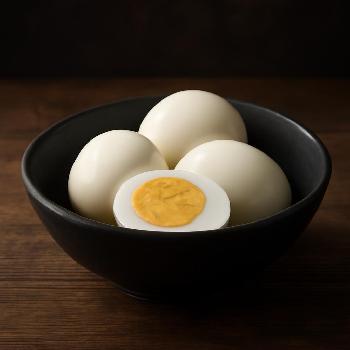Cooking Tips > Cooking Techniques > Egg Cooking Techniques > How to hard boil eggs
How to hard boil eggs
Learn how to cook perfect hard-boiled eggs every time. This simple guide provides detailed instructions and tips for achieving consistently delicious and easy-to-peel hard-boiled eggs, making them ideal for salads, snacks, or deviled eggs. Follow these steps for success!

Step 1: Choosing Your Eggs
Fresh eggs can be harder to peel after boiling. Ideally, use eggs that are about a week old or older. This allows the air pocket inside the egg to enlarge slightly, making peeling easier. However, very old eggs are not recommended. Make sure your eggs are clean and without cracks.
Step 2: Placing Eggs in the Pot
Place the eggs in a saucepan in a single layer. Avoid overcrowding the pot, as this can lead to uneven cooking. Ensure there is enough room for the eggs to move freely.
Step 3: Adding Water
Cover the eggs with cold water. The water level should be about 1 inch above the eggs. Cold water helps the eggs heat evenly, reducing the risk of cracking.
Step 4: Heating the Water
Bring the water to a rolling boil over medium-high heat. Once boiling, immediately remove the pot from the heat. Cover the pot with a lid.
Step 5: Steeping Time
Let the eggs sit in the hot water, covered, for the following times depending on your desired doneness: Large Eggs:
12 minutes for firm but not chalky yolks.
15 minutes for very firm yolks.
Extra-Large Eggs: add 1-2 minutes to the cooking time.
This steeping time allows the eggs to cook gently, preventing them from becoming rubbery.
Step 6: Cooling the Eggs
After the steeping time, immediately drain the hot water and rinse the eggs under cold running water or place them in an ice bath. This stops the cooking process and makes the eggs easier to peel. Keep the eggs in the cold water for at least 5 minutes.
Step 7: Peeling the Eggs
Gently tap the egg all over on a hard surface to crack the shell. Start peeling from the larger end of the egg, where the air pocket is located. Peeling under running water can help remove the shell more easily. If the shell sticks, try rolling the egg gently on the counter to loosen it. Make sure all of the shell is removed.
Step 8: Storing Hard Boiled Eggs
Hard-boiled eggs can be stored in the refrigerator for up to one week. Store them in their shells to prevent them from drying out. Do not freeze hard-boiled eggs, as the texture will become rubbery and unpleasant.
FAQ
-
Why are my hard-boiled eggs difficult to peel?
Very fresh eggs can be difficult to peel. Using eggs that are a week old or older will make peeling easier. Also, cooling the eggs immediately in an ice bath helps to separate the egg from the shell. -
How do I prevent the green ring around the yolk?
The green ring is caused by overcooking. Avoid overcooking the eggs by using the recommended steeping time and cooling them quickly in cold water. Also, don't use high temperatures when cooking them. -
How long can I store hard-boiled eggs in the refrigerator?
Hard-boiled eggs can be stored in the refrigerator for up to one week. Keep them in their shells to prevent them from drying out. -
Can I hard boil eggs in the microwave?
It is not recommended to hard boil eggs in the microwave. Eggs can explode in the microwave due to the rapid buildup of steam. This can be dangerous and messy. The stovetop method is safer and more reliable. -
What's the best way to use hard boiled eggs?
Hard-boiled eggs are incredibly versatile! Enjoy them as a quick and healthy snack, slice them over salads for added protein, or use them to make classic deviled eggs. They're also a great addition to egg salad sandwiches or chopped into potato salad.
